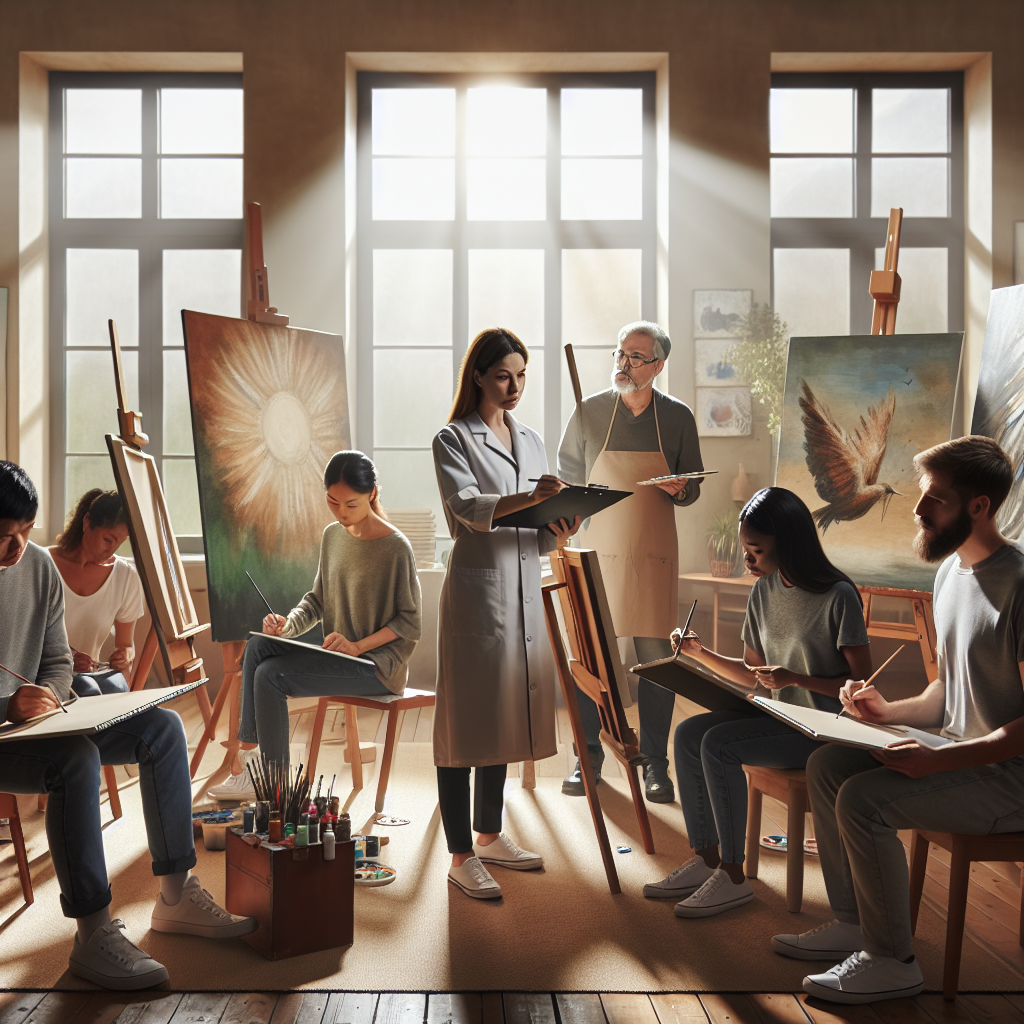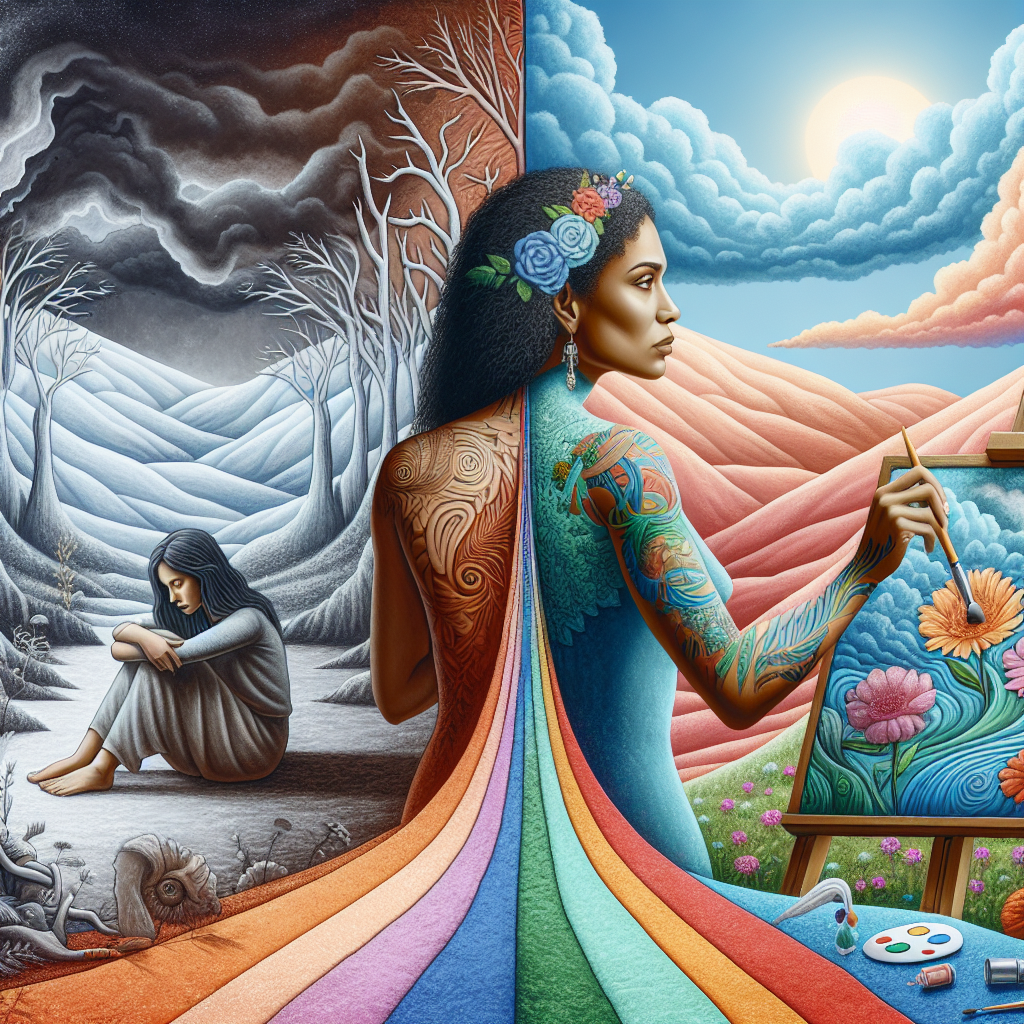-
Table of Contents

“Art Therapy: Healing Through Creative Expression in Addiction Recovery”
Introduction
Art therapy has emerged as a powerful tool in the realm of addiction recovery, offering a unique and creative approach to healing. This therapeutic practice integrates the use of artistic expression with traditional therapeutic techniques to help individuals explore their emotions, develop self-awareness, and cope with the challenges of addiction. By engaging in various forms of art, such as painting, drawing, sculpture, and music, individuals in recovery can access and process complex feelings that may be difficult to articulate through words alone. Art therapy provides a safe and non-judgmental space for self-expression, allowing individuals to confront and work through underlying issues that contribute to their addiction. Additionally, the creative process can foster a sense of accomplishment, boost self-esteem, and promote emotional resilience. As a complementary approach to conventional addiction treatment methods, art therapy plays a crucial role in supporting holistic recovery and enhancing overall well-being.
Exploring The Benefits Of Art Therapy In Addiction Recovery
Art therapy has emerged as a powerful tool in the realm of addiction recovery, offering a unique and creative approach to healing. This therapeutic practice harnesses the transformative power of artistic expression to help individuals navigate the complex journey of overcoming addiction. By engaging in various forms of art, such as painting, drawing, sculpting, and even digital media, individuals can explore their emotions, confront their struggles, and ultimately find a path to recovery.
One of the primary benefits of art therapy in addiction recovery is its ability to provide a non-verbal outlet for expression. Many individuals grappling with addiction find it challenging to articulate their feelings and experiences through words alone. Art therapy offers an alternative means of communication, allowing them to externalize their internal conflicts and emotions in a tangible form. This process can be incredibly cathartic, as it enables individuals to confront and process their feelings in a safe and supportive environment.
Moreover, art therapy fosters self-discovery and self-awareness. As individuals engage in the creative process, they often uncover hidden aspects of themselves and gain insights into the underlying causes of their addiction. This heightened self-awareness can be instrumental in identifying triggers and developing healthier coping mechanisms. Through the creation of art, individuals can also explore their identities beyond their addiction, rediscovering their strengths, passions, and aspirations.
In addition to promoting self-awareness, art therapy can enhance emotional regulation. Addiction often stems from an inability to manage intense emotions, leading individuals to seek solace in substances or behaviors. Art therapy provides a constructive outlet for these emotions, helping individuals to channel their feelings into their artwork rather than resorting to harmful coping strategies. Over time, this practice can improve emotional resilience and equip individuals with healthier ways to navigate life’s challenges.
Furthermore, art therapy can strengthen the therapeutic alliance between individuals and their therapists. The collaborative nature of art therapy sessions fosters a sense of trust and rapport, creating a safe space for individuals to explore their vulnerabilities. This strong therapeutic relationship is crucial for effective addiction treatment, as it encourages individuals to engage more fully in the recovery process and remain committed to their goals.
Another significant benefit of art therapy is its ability to reduce stress and promote relaxation. The act of creating art can be inherently soothing, providing a sense of calm and mindfulness. This relaxation response can counteract the physiological and psychological stressors associated with addiction, aiding in the overall recovery process. Additionally, the sense of accomplishment and pride that comes from creating art can boost self-esteem and reinforce a positive self-image.
Art therapy also offers a sense of community and connection. Group art therapy sessions provide opportunities for individuals to share their experiences and support one another in their recovery journeys. This sense of belonging can be incredibly empowering, as it reminds individuals that they are not alone in their struggles. The shared creative process can foster a sense of camaraderie and mutual understanding, which can be invaluable in maintaining long-term sobriety.
In conclusion, art therapy plays a vital role in addiction recovery by offering a multifaceted approach to healing. Through creative expression, individuals can explore their emotions, enhance self-awareness, regulate their feelings, and build strong therapeutic relationships. The stress-reducing and community-building aspects of art therapy further contribute to its effectiveness in supporting individuals on their path to recovery. By embracing the transformative power of art, individuals can find hope, healing, and a renewed sense of purpose in their lives.
How Art Therapy Facilitates Emotional Healing In Addiction Recovery
Art therapy has emerged as a powerful tool in the realm of addiction recovery, offering a unique avenue for emotional healing. This therapeutic approach leverages the creative process to help individuals express and understand their emotions, which is particularly beneficial for those grappling with addiction. The journey to recovery is often fraught with emotional turmoil, and traditional talk therapies may not always suffice in addressing the complex layers of feelings that accompany addiction. Here, art therapy steps in, providing a non-verbal medium through which individuals can explore and articulate their inner experiences.
One of the most significant ways art therapy facilitates emotional healing is by offering a safe space for self-expression. Many individuals struggling with addiction have difficulty verbalizing their emotions, either due to shame, guilt, or simply a lack of words to describe their feelings. Through art, they can bypass these barriers and communicate their emotions visually. This process not only helps in externalizing internal conflicts but also in gaining insights into their emotional state. For instance, a person might create a painting that reflects their sense of chaos or despair, which can then be discussed and analyzed with the therapist. This visual representation of emotions can be incredibly cathartic, allowing individuals to confront and process feelings they might have otherwise suppressed.
Moreover, art therapy encourages mindfulness and presence, which are crucial components of addiction recovery. Engaging in creative activities requires focus and concentration, drawing individuals into the present moment. This mindfulness can be a powerful antidote to the often overwhelming cravings and anxieties associated with addiction. By immersing themselves in the creative process, individuals can find a temporary respite from their struggles, which can be both soothing and empowering. This sense of accomplishment and control over the creative process can translate into a greater sense of agency in their recovery journey.
In addition to fostering self-expression and mindfulness, art therapy also plays a pivotal role in building self-esteem and resilience. Addiction often erodes an individual’s sense of self-worth, leaving them feeling powerless and defeated. Creating art, however, can be a transformative experience that rebuilds confidence. Completing an art project, no matter how simple, provides a tangible sense of achievement. This success can bolster self-esteem and encourage individuals to take further positive steps in their recovery. Furthermore, the creative process itself can be a metaphor for the recovery journey—starting with a blank canvas, facing challenges, making mistakes, and ultimately creating something meaningful and beautiful.
Art therapy also facilitates emotional healing by fostering a sense of connection and community. Group art therapy sessions, in particular, can be a powerful way for individuals to share their experiences and support one another. The act of creating alongside others who are on a similar journey can reduce feelings of isolation and build a sense of camaraderie. Sharing artwork and discussing its meaning can lead to deeper understanding and empathy among group members, creating a supportive network that is invaluable in the recovery process.
In conclusion, art therapy offers a multifaceted approach to emotional healing in addiction recovery. By providing a safe space for self-expression, promoting mindfulness, building self-esteem, and fostering connection, it addresses the emotional complexities of addiction in a holistic manner. As individuals navigate the challenging path to recovery, art therapy can be a beacon of hope, guiding them towards emotional healing and a renewed sense of self.
Q&A
1. **Question:** How does art therapy help individuals in addiction recovery?
**Answer:** Art therapy helps individuals in addiction recovery by providing a non-verbal outlet for expressing emotions, reducing stress, and improving self-awareness, which can aid in addressing underlying issues related to addiction.
2. **Question:** What are some specific techniques used in art therapy for addiction recovery?
**Answer:** Specific techniques used in art therapy for addiction recovery include drawing, painting, sculpting, and collage-making, which allow individuals to explore their feelings, develop coping skills, and build a sense of accomplishment and self-esteem.
Conclusion
Art therapy plays a significant role in addiction recovery by providing a non-verbal outlet for expressing emotions, reducing stress, and fostering self-awareness. It helps individuals process trauma, develop coping skills, and build self-esteem, which are crucial for long-term recovery. Through creative expression, participants can explore their feelings and experiences in a safe and supportive environment, facilitating emotional healing and personal growth. Overall, art therapy is a valuable complementary approach in the holistic treatment of addiction, contributing to improved mental health and sustained sobriety.



